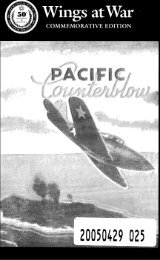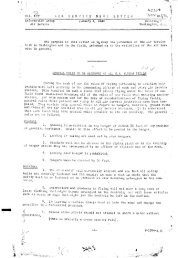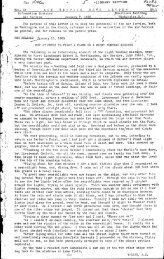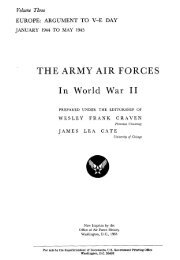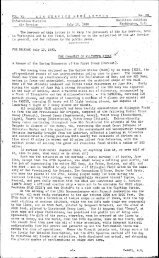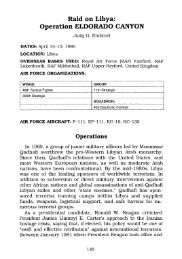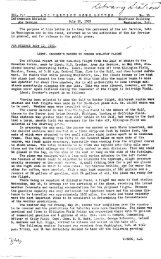News Letter 1941 Jul-Dec - Air Force Historical Studies Office
News Letter 1941 Jul-Dec - Air Force Historical Studies Office
News Letter 1941 Jul-Dec - Air Force Historical Studies Office
Create successful ePaper yourself
Turn your PDF publications into a flip-book with our unique Google optimized e-Paper software.
THE -fIR FORCES NEil'S LETTER<br />
After the loss of four cruisers and seven destroyers,<br />
the fleet withdrew. Here the real factors in<br />
the question of air power versus sea power were<br />
demonstrated in one operation; namely, immense<br />
bambing forces and the fact that the ships would<br />
have to remain subject to bombing.<br />
Malta also shows the impossibility of a fleet<br />
remaining within range of large bombing forces. It<br />
is only 60 miles from Italy and is untenable as a<br />
fleet base. The fact that the British still hold<br />
it is of minor importance. It is no longer a base--<br />
it is just a piece of land. On the other hand,<br />
Gibraltar--7S0 miles from Italy--hardly has been<br />
bothered by bombing. The distance is too great<br />
for bombardment operations to be carried on with<br />
the necessary mass and continuity. Gibraltar is<br />
protected from massive and continuous bombing by<br />
distance.<br />
Convoys operating in the North Sea, the English<br />
Chennel, and the Mediterranean gain partial protection<br />
from the time element. By making use of<br />
darkness to pass the more dangerous areas, the<br />
convoys are within effective bombing range too<br />
short a time to be disastrously endangered, unless<br />
massive bombing forces are on hand to operate<br />
against them. There have been many ships lost and<br />
pther ships injured, but the damage has not been<br />
great enough to prevent occasional passage. Scapa<br />
Flow, 300 miles from N~rway, has been made untenable<br />
as a fleet base by the bombing threat. In<br />
this case, Germany has a sufficient number of bombing<br />
planes based closely enough to make the danger<br />
of remaining at the base too great for the possible<br />
military advantages that would be obtained.<br />
In the Mediterranean, Italian air operations<br />
originally appeared to give the lie to all these<br />
contentions. Failure of the Italian <strong>Air</strong> <strong>Force</strong> to<br />
be more successful in preventing British convoy<br />
and fleet operations close to Italian and Libyan<br />
coasts was one of the major mysteries of the war.<br />
The British even penetrated the Adriatic (at night),<br />
<strong>Dec</strong>ember 19-20, 1940, and bombarded the Albanian<br />
seaport of Valona without aerial interference by<br />
the Italians. It is now apparent that Italian air<br />
power was not oP/i!ratingin sufficient mass in these<br />
waters to perform its missions effectively. When<br />
it was reenforced by German squadrons, the last<br />
British convoy to pass through suffered such extensive<br />
losses that no more convoys have been attempted.<br />
The war has showed roe fact conclusively--<br />
air power dominates sea power in narrow seas and<br />
near the coasts.<br />
Was not the insufficiency of Italian air power<br />
in the Mediterranean one of the inherent weaknesses<br />
of air power? And if air power is depended<br />
upon, are we not apt to find that it may be unavailable<br />
at the critical time? Harbor defenses<br />
are so comforting. The big ugly-muzzled guns are<br />
always there, ready and waiting--a definite assur-<br />
23<br />
ance of protection for one little spot for all<br />
time. Doubt as to the availability of air power<br />
can be dismissed as far as the United States is<br />
concerned. We shall always have it in the future<br />
in ample quantity. And instead of a dozen or two<br />
dozen gtns defending a harbor, _ shall have 2,000<br />
or 4,000 bombers ready to be concentrated for the<br />
defense of any point, not of harbors alone, but of<br />
all the beaches and all the coasts.<br />
Harbor defenses in the past _re constructed to<br />
perform the following functions: first, to permit<br />
movement of our naval forces in and out of harbors;<br />
secondly, to protect harbor facilities and ships<br />
in the harbor from naval gunfire and torpedoes;<br />
thirdly, to prevent enemy ships from entering the<br />
harbor; fourthly, to furnish incidental support to<br />
defense against landing attacks within range of<br />
the defense guns.<br />
What has air power done to these missions? If a<br />
hostile fleet cannot remain on guard outside a. harbor<br />
to prevent the exit or lngre .. of our own fleet<br />
because of the threat of bombing, then no harbor<br />
defenses are necessary for that purpose alone. Ex~<br />
cept for hostile air power the British fleet might<br />
have been maintained close to the Skagerrak or to<br />
the Kiel Canal or to Heligoland. This mission of<br />
harbor defenses is ended. <strong>Air</strong> power can perform<br />
this mission far more effectively than guns ever<br />
could, since guns never had the necessary range to<br />
provide ample maneuver room for a fleet leaving a<br />
harbor.<br />
Protection of ships and harbor facilities from<br />
naval gunfire and torpedoes is still as necessary<br />
a function of harbor defense as ever. The European<br />
war has shown that ships can stay within bombing<br />
range at night long enough to make raids on shore<br />
installations. The French and British both raided<br />
Italian shore installations and escaped with minor<br />
damage. The British have raided the Dodecanese<br />
and the Libyan coast and have escaped without serious<br />
injury. The British bombarded the Germanheld<br />
airdromes at Stavanger from cruisers for several<br />
hours. Thus the experience of the European<br />
war seems to prove that air power is not Yet sufficiently<br />
strong to prevent raids and naval bombardments.<br />
Harbor defenses must be provided for<br />
thi. purpose.<br />
Whether or not air ~r can deny enemy ships<br />
access to harbors and adjacent waters depends upon<br />
the nature of the harbor. In such a harbor as<br />
Puget Sound, where hostile ships would have to steam<br />
300 or more miles to get in and out, and where they<br />
never could be lost sight of in the narrow waters,<br />
air power should suffice to entrap the raiders.<br />
They might get in, but they never could get out.<br />
In the case of shallow harbors easy of access. the<br />
problem would be similar to that of a naval raid:<br />
some guns would be required to prevent a raid, but<br />
air power would be ample to prevent the continued<br />
use of the harbor.




